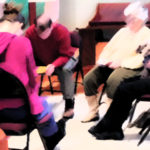How do we engage in a civil discourse on race without being perceived as a race baiter?
Race is only one of the “hot button” topics of our day. Other related topics include immigration, Islamists, liberals, conservatives and the religious right. The charge of “race baiting” sometimes is made whenever someone brings up race as the dominant value to be leveraged for the advantage of some given group.
The charge usually serves as a deflector of the conversation, even a distraction and certainly a detractor. Depending on the parties involved, anything but civil discourse happens. Attempts at working through conflictual matters are delayed, but the conflict continues, perhaps even raising in level.
‘Clash of cultures’
Realizations must be made for civil discourse to happen and for resolution to the conflicts to occur. We are in what has been called a “clash of cultures.” Each of us has been reared in a style peculiar to each people group. Sometimes, it seems to be us against them. It isn’t supposed to be that way. We who follow Christ have a mandate to be engaged in purposeful reconciliation.
Reconciliation is hard, but it is happening, though—thanks be to God. It is happening because some people take their Christian commitment seriously. We are determined to be obedient to God through Jesus Christ. We intend to see the love of God extended to each person, regardless of who the person is or what her or his complexion may be.
I was reared near a steel-mill town, Farrell, Penn. At least 13 cultural groups lived in that city. Most gathered in enclaves. Most were immigrants from Europe brought especially to work in the steel mills. Each enclave had perimeters for housing. Each group was separated and buffered by African-Americans or people of Jewish origins. Europeans were mostly first- or second-generation immigrants. Their cultural heritage was preserved by Community Houses, large gathering places where their traditions and special events were held. Each group had derogatory code names for groups other than their own. Such matters served to fuel conflict between these groups.
But all cultures in the city had some things in common. They worked primarily in Farrell Sheet and Tube, a steel mill. Each steel mill was unionized, which provided a crossing, even blending, of race and culture lines. At the annual union picnics or special festivities, they all attended, sometimes joining their ethnic group, sometimes blending. It was the youth of each group who became the synthesizers through school, athletics, dating, sandlot play or similar activities.
‘Classism’
Sign up for our weekly edition and get all our headlines in your inbox on Thursdays
Farrell is no longer what it used to be. The Community Houses are gone. No one group is territorial. Classism has replaced culture and racism as a major concern. This classism calls for further dialogue and discourse of a slightly different nature.
With regard to race, though, there are still many places where ethnic enclaves and groupings are in need of conversation and actions that move the context to a more civil level. Following are some questions for consideration by those in these circumstances. Reflection through these questions can be beneficial for developing civil discourse within respective ethnic groups and across racial lines. The questions:
• Who sets the standards for what “American” must be or might be like?
• How may we learn about and from each other?
• How much are we willing to learn from and about each other?
• What do others have that we need?
• What do others have that we want?
• Where is the productive arena for such questions to be raised?
• Who is or should be invited to the conversations?
• By what name shall the conversation take place—debate, roundtable, forum, sermon, symposium, lecture?
• What best describes this sharing of ideas?
• What goals do you hope to accomplish?
• How will interaction take place?
• Who else thinks as you do?
• How best might you include those who don’t share your perspectives?
• What is your intended result? Do others share that same desire?
• What resources are available to you—people, books, organizations, media?
To be sure, those who oppose you will find inappropriate ways to describe what you are attempting to do. But to whom is your ultimate loyalty due?
Emmanuel L. McCall
Interim pastor, Friendship Baptist Church
Adjunct professor, Mercer University’s McAfee School of Theology
Atlanta
If you have a comment about this column or wish to ask a question for a future column, contact Bill Tillman, consulting ethicist for “Right or Wrong?” at [email protected].














We seek to connect God’s story and God’s people around the world. To learn more about God’s story, click here.
Send comments and feedback to Eric Black, our editor. For comments to be published, please specify “letter to the editor.” Maximum length for publication is 300 words.